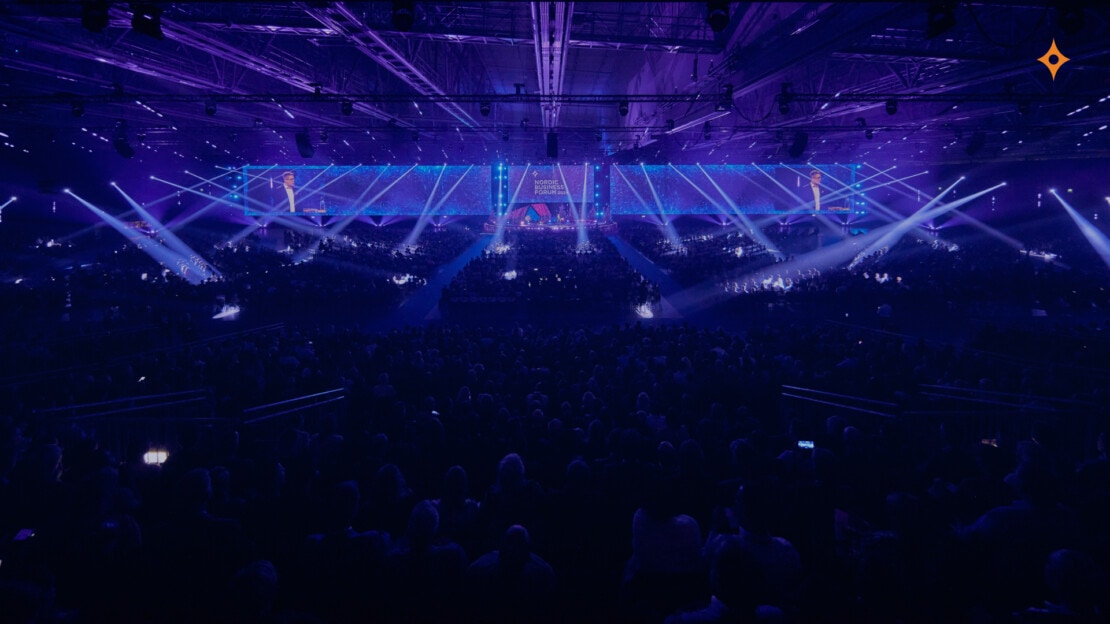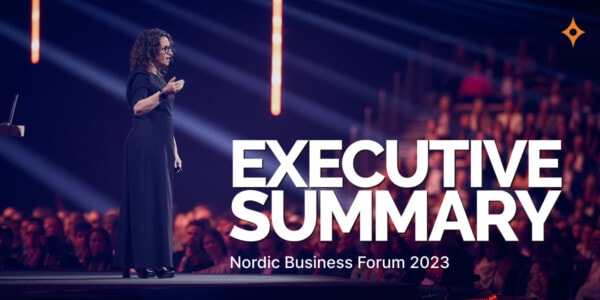25Oct2023
Nordic Business Forum 2023 brought together visionaries, thought leaders, and industry experts, unraveling insights that transcend traditional leadership paradigms.
In this blog, we explore the four key insights that encapsulate several of the learnings from our world-class speakers. From fostering healthy organizational cultures to navigating the complexities of artificial intelligence, we hope the revelations from this year’s forum can serve as a guiding light, illuminating the path to sustainable success in today’s competitive and uncertain business landscape.
4 Key Leadership Insights from Nordic Business Forum 2023
#1 Being Smart is Not Enough
In the age of information overload, having the most intelligent people at your company does not equal success. You also need to be able to maintain those people and get the best out of them. You need healthy organizational culture.
“I’ve worked with some of the smartest organizations in the Silicon Valley that don’t make it because they’re smart, but they’re really dysfunctional. I’ve worked with other companies that have leaders and employees that don’t come from the best schools, they’re not smarter than the competition, they’re just really healthy. They work well together and they outperform their competition every time.” – Patrick Lencioni
Whereas management expert Patrick Lencioni emphasized the importance of playing to your team’s strengths, the CEO of Norges Bank Investment Management, Nicolai Tangen, reminded us that “firms where people have fun perform better.” A healthy organizational culture is crucial to maximizing your team’s potential and retaining the best talent.
#2 Simplicity is Key
Productivity expert Tim Ferriss reminded us that being effective and being efficient are two different things. Focusing on doing what’s effective is more important than being efficient.
“You can be inefficient at doing the right things and still get great results.” – Tim Ferriss
You can also become really good at doing meaningless things. So make sure the things you are doing are the right things. Remember the Pareto Principle — 80% of the outcomes come from 20% of the work.
Jos de Blok, the founder and CEO of the disruptive nursing organization Buurtzorg, stressed simplicity in organizational hierarchy and leadership. He pointed out how unnecessary bureaucracy makes companies slow and hierarchical systems easily get too complex. Once you lose the unnecessary meetings and overly complex policies, you have more time and energy to focus on the essential things.
Columbia Professor Sheena Iyengar also reminded us to apply the simplifying tactic to your products and offerings. Having too many options makes it more challenging to make a decision, which also applies to your customers. Simplicity creates clarity and eases decision-making.
#3 Don’t Lose Sight of Your Purpose
Losing sight of the bigger picture is easy. But it’s also harmful. As Harvard Professor Rebecca Henderson pointed out, evidence suggests that having an authentic purpose significantly impacts productivity, creativity, and performance.
“You can be purpose-driven and make money.” – Rebecca Henderson
Ukrainian sustainability expert Maryna Saprykina used a very current real-life example of Ukrainian companies that draw their resilience from the big objective: helping Ukraine win the war. The companies that have been able to keep operations going have only been able to do so by focusing on the bigger goal.
The courageous activist and Nobel Peace Prize laureate Malala Yousafzai reminded us that having your sight on the bigger purpose also helps us stay motivated when things get tough. “You should redouble your efforts in the face of setbacks,” she said.
#4 Ignore AI at Your Own Risk
AI is not necessarily going to end the human race or steal our jobs, but it’s here to stay whether we like it or not. It’s likely to permanently impact how we work, socialize, and conduct business.
Even futurists like Amy Webb cannot tell what the future of AI looks like. There are too many variables at play. But that doesn’t stop people from making predictions. As the CRO of WithSecure, Mikko Hyppönen, put it: how could the human with an average IQ of 100 predict what the AI with an IQ of 1 billion will get up to?
“Something happens with the exponential nature of intelligence. When it reaches a certain point, it exceeds expectations as to its capabilities”, explained Mo Gawdat, previous Google X CBO and AI expert.
We cannot predict AI, but we can prepare for it. Businesses are often shortsighted when thinking about AI. They need to start thinking far ahead into the future instead of only thinking about how to cut corners with AI in the short term.
“As AI evolves, it will require entire segments to be reimagined.” – Amy Webb.
As the serial entrepreneur and AI optimist Scott Galloway put it, there are positives to AI. “AI has already generated more value in terms of market capitalization in a shorter period of time than any technology in history.” It’s clear there will be people benefitting immensely from these new technologies. But those are not always people with good intentions. AI also enables completely new scams and cybersecurity threats.
Both Amy Webb and Mo Gawdat stressed that while the future of AI is unpredictable, it’s not totally out of our control. We can still affect the direction of AI. Now is the time to discuss the ethics around AI and start making sure it’s primarily used to advance our well-being.
Hungry for More Leadership Insights?
Did you enjoy these insights? Learn more through our extensive Executive Summary Package!
Download the complete Executive Summary Package for free.
The Executive Summary Package includes:
- Written summaries of our speakers’ presentations
- Keynote sketchnotes for visual learners
- Carefully conducted questions to reflect and deepen your learning
- Summaries from past years, including Seth Godin, Simon Sinek, Richard Branson, Carla Harriss, and many other world-class speakers!

 by:
by: 
